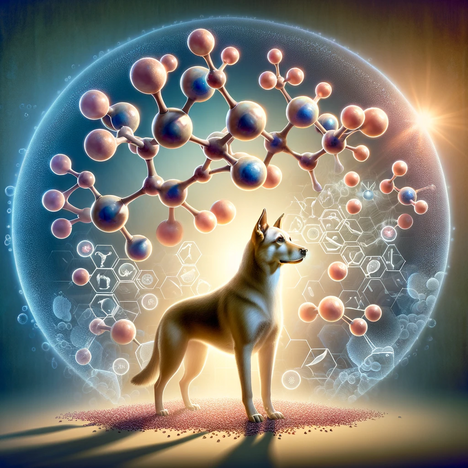Lactoferrin

What is lactoferrin?
Lactoferrin is a glycoprotein that plays an important role in the immune system. It is best known for binding and transporting iron, but its functions go far beyond that. Lactoferrin has antimicrobial, antiviral, antifungal, anti-inflammatory and antioxidant properties. Because of this wide range of health-promoting effects, lactoferrin has received increasing attention in animal nutrition and health in recent years.
Benefits of lactoferrin for dogs
Support of the immune system
Lactoferrin strengthens the immune system in dogs by supporting and modulating the activity of cells responsible for fighting off infections. It can help make dogs more resistant to a variety of pathogens.
Antimicrobial effect
Due to its ability to bind iron, lactoferrin deprives bacteria of an important resource they need to grow. This makes it a natural antibiotic without the risk of bacteria developing resistance.
Promotion of intestinal health
Lactoferrin can help promote the growth of beneficial bacteria in the gut while fighting harmful microorganisms. This supports healthy gut flora and can reduce digestive problems.
Anti-inflammatory properties
Lactoferrin has been shown to reduce inflammation in the body, which can be particularly beneficial for chronic conditions such as arthritis.
Support with iron regulation
Lactoferrin helps regulate iron metabolism in the body, which can be beneficial for dogs with iron deficiency anemia.
Disadvantages of lactoferrin in dogs
Potential hypersensitivity reactions
Although rare, some dogs may have an allergic reaction to lactoferrin, especially if they are sensitive to dairy products in general. Symptoms may include skin rashes, itching or digestive problems.
Cost
Because lactoferrin is a specialized supplement, its regular use can be costly, especially for larger dogs or for long-term use.
Lack of long-term studies
Although the research to date is promising, there are not yet enough long-term studies comprehensively investigating the effects of lactoferrin on dogs.
Using a promising supplement wisely
Lactoferrin offers a range of potential health benefits for dogs, from boosting the immune system to supporting gut health. Proper dosing and monitoring of the dog's response are critical to ensure lactoferrin has a positive effect. With a responsible approach, lactoferrin can be a valuable supplement that contributes to your dog's overall health and well-being.
If you notice any signs of hypersensitivity or poisoning in your dog, you should see your vet immediately. We are not a substitute for a vet, but we try to be as accurate as possible. Every dog reacts differently and we recommend you get a second opinion or consult your vet if in doubt.
Stay healthy and take good care of your four-legged friend!😊
Similar to Lactoferrin
Lysozyme is an enzyme that occurs naturally in the saliva, tears and other bodily fluids of many living things, including humans and dogs. Its main function is to destroy the cell walls of certain...
Colostrum is the first milk produced by a mammalian mother after the birth of her young. This milk contains many valuable nutrients and antibodies that strengthen the newborn's immune system and...
Beta-glucans are polysaccharides, i.e. long chains of glucose units that are linked together by special bonds. There are different types of beta-glucans, depending on how the glucose units are...
Glucans are polysaccharides, i.e. long chains of glucose units. They can be branched and linked in different ways, depending on their source. The most common glucans are beta-glucans and...



